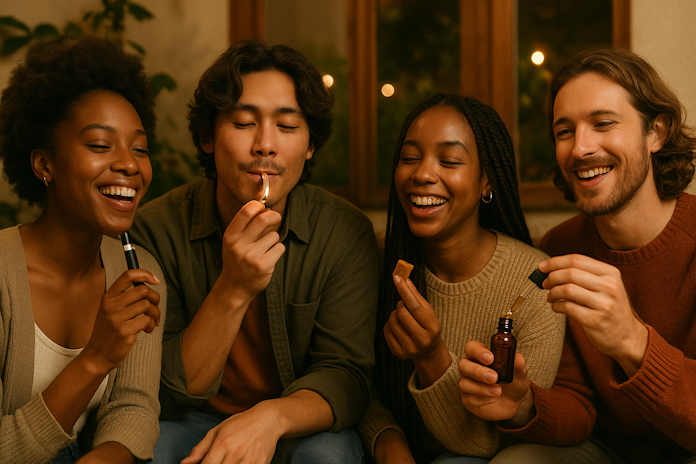
Herb
How Long Do THCA Effects Really Last? A Breakdown by Product Type
THCA lasts longer than you think. Find out why.
Tetrahydrocannabinolic acid (THCA) is the non-intoxicating precursor to THC found in raw cannabis plants. When heated through smoking, vaping, or cooking, THCA undergoes decarboxylation, converting into the psychoactive THC, responsible for the characteristic “high.”
Knowing how long THCA effects last matters for both frequent and occasional users. The duration of THCA effects varies based on several factors, including consumption method, dosage, individual metabolism, and whether THCA has been decarboxylated.
This article breaks down the duration of THCA effects by product type, key influencing factors, potential side effects, and answers commonly asked questions.
Factors That Impact How Long Your High Lasts

Herb
If you’ve ever wondered, “How long do the effects of THCA last?” you’re not alone. The truth is, there’s no one-size-fits-all answer. Several factors influence how long your high will last and how strong it will feel. These factors include how you consume THCA, how much you take, your body’s unique chemistry, and even whether you’ve eaten recently.
Below, we break down the most important things that can affect how long THCA effects stick around in your system.
Method of Consumption
How you consume THCA directly influences the onset and duration of its effects. Inhalation methods like smoking or vaping lead to rapid absorption, with effects being felt within minutes and lasting anywhere from 2 to 4 hours.
Oral ingestion methods, such as edibles or tinctures, result in slower onset times (30 minutes to 2 hours) but often longer-lasting effects, typically ranging from 6 to 8 hours.
Raw THCA (like in fresh cannabis juice or unheated flower) doesn’t cause a traditional high because it hasn’t been heated. Instead, THCA may offer subtle, therapeutic effects like reduced inflammation or nausea relief without the psychoactive effects THC is known for.
Dose & Potency
With higher doses of THC and more potent products like THCA diamonds, come effects that are typically more intense and longer-lasting.
However, body chemistry and tolerance levels play a significant role. What may be a moderate dose for some individuals could be overwhelming for others. It’s recommended to start with a low dose (one puff or 2.5mg) and gradually increase as needed.
Whether THCA Was Heated
THCA is non-intoxicating in its raw form, meaning it doesn’t have psychoactive properties. Only when heated does it convert to delta-9 THC, producing psychoactive effects.
If THCA is eaten raw (like in a smoothie or THCA tincture), it typically won’t make you feel high, but it might still offer therapeutic benefits. However, smoking, vaping, or cooking THCA-rich products will deliver psychoactive effects.
Tolerance, Metabolism, Body Weight
Individual factors like tolerance, metabolism, body weight, and body fat percentage affect how long THCA’s effects last. Due to increased tolerance, chronic users may experience shorter durations and less potent effects.
At the same time, cannabis users with faster metabolisms may absorb and process THC more quickly, reducing the duration of its effects.
Empty Stomach vs. Fed
Other factors affecting THCA absorption and duration of effects are whether you consume it on an empty stomach. Consuming it on an empty stomach can lead to a quicker onset of effects but may also increase the intensity. Conversely, eating beforehand can slow absorption and delay the onset, but the high may be more gradual and last longer.
Duration of THCA Effects by Product Type

Herb
How long the effects of THCA last depends a lot on the type of product you use. Each method of consumption interacts with your body differently; some kick in fast and fade quickly, while others take longer to activate but linger for hours. Below is a breakdown of the average duration by product type.
Smoking THCA Flower
- Duration: 2 to 4 hours
Smoking THCA-rich flower provides fast-acting effects by instantly converting THCA into THC through heat. The smoking THCA effects include a rapid onset of euphoria, mood elevation, and physical relaxation, with effects typically felt within minutes. However, depending on the dosage, the high generally wears off after a couple of hours due to quick absorption and metabolism. This method is preferred by cannabis consumers who want fast relief or immediate effects.
THCA Vapes & Disposables
- Duration: 2 to 4 hours
THCA vapes and disposables also rely on heat to convert THCA into THC. This results in a rapid delivery of the cannabinoid, THC, via the lungs. The THCA vape effects are similar to those of smoking, but vaping can be more discreet and less harsh on the lungs. Consumers often describe the experience as smooth and fast-acting. Vaping allows for more controlled dosing; however, the effects of vaping come on quickly and can last up to 4 hours.
THCA Dabs & Concentrates
- Duration: 2 to 4 hours
Dabbing involves vaporizing concentrated THCA at high temperatures, resulting in a potent and immediate high. Because of the high THC content after decarboxylation, the effects can be more intense and longer-lasting than those of other inhalation methods. This method is recommended for experienced users.
THCA Gummies & Edibles
- Duration: 6 to 8 hours
If the THCA edibles undergo decarboxylation during preparation, they convert THCA to THC. When consumed, the THC is metabolized in the liver, producing a delayed onset of effects (30 minutes to 2 hours) but a prolonged duration. Users often report a more intense and body-focused high.
THCA Tinctures
- Duration: 6 to 8 hours
THCA tinctures can be consumed sublingually or added to food and beverages. When taken sublingually (either under the tongue or between the gum and cheek), effects may begin within 15 to 45 minutes and last a few hours. Ingesting tinctures leads to a slower onset but extended effects, similar to edibles. For THCA tinctures to have any psychoactive properties, they have to undergo decarboxylation.
THCA in Raw Form
Raw THCA can be found in fresh cannabis leaves or flowers that haven’t been heated. Some people juice raw cannabis or add it to smoothies. Unlike THC, because it hasn’t been decarboxylated (heated), THCA doesn’t cause a high. When it’s consumed in its raw form, THCA may help with things like inflammation, pain, or protecting brain cells. However, more cannabis research is needed to fully understand how it works in the body.
Potential Side Effects of Consuming THCA

Elsa Olofsson / Unsplash
Just like any cannabis product, THCA can cause side effects, especially when it’s heated and becomes THC. These effects can vary depending on the dose, product type, and your individual tolerance or body chemistry. Most side effects are short-term, but the frequent use of high doses could lead to more long-lasting changes.
Short-Term Side Effects
When THCA is decarboxylated into THC through heating, short-term side effects may include:
- Dry mouth and dry eyes
- Dizziness or lightheadedness
- Increased heart rate
- Anxiety or paranoia (especially with high doses)
- Impaired coordination or short-term memory
These are the most common side effects when THCA is heated and you consume cannabis in its active THC form, such as through smoking, vaping, or edibles. They usually fade within a few hours, especially after the high wears off.
Long-Term Side Effects
High or frequent use of decarboxylated THCA (THC) may lead to:
- Tolerance buildup (needing more to feel the same effects)
- Potential for cannabis use disorder in some individuals
- Emotional blunting or brain fog (with heavy daily use)
As with any cannabinoid, it’s a good idea to start with a low dose and go slow, especially if you’re new to cannabis or trying a new THCA product. Listening to your body and taking breaks when needed can help avoid uncomfortable side effects.
Raw THCA Side Effects
When consumed raw (like in juice, tinctures, or capsules), THCA isn’t intoxicating and won’t produce a high. But even in its raw form, it may still have mild effects like an upset stomach.
FAQs

Herb
Is THCA the same as THC?
No, THCA is not the same as THC. THCA is the acidic precursor to delta-9 THC and is non-intoxicating in its raw form. THCA converts to THC when heated, producing psychoactive effects.
Is THCA better than THC?
Whether THCA is “better” than THC is subjective and depends on your individual preferences and intended use. Raw cannabis products with THCA may offer potential therapeutic benefits without psychoactive effects, while THC provides the characteristic high often sought by recreational users.
What are the downsides of THCA?
When converted to THC, potential downsides include side effects like anxiety, dizziness, and impaired cognition. Additionally, smoking THCA-rich products can have respiratory implications.
Why do some people not like THCA?
Some individuals might be sensitive to the psychoactive effects of THC after decarboxylation, resulting in discomfort or anxiety. Others may choose non-intoxicating cannabinoids for therapeutic purposes.
Why does THCA taste different?
Raw cannabis flower rich in THCA has different terpene levels compared to decarboxylated THC products, leading to variations in taste and aroma.
Does THCA show up on a drug test?
Yes, once THCA is converted to THC, it can be detected by a standard drug test since these tests usually detect THC metabolites. Standard urine drug tests, as well as saliva tests, blood tests, and hair tests, don’t detect raw THCA. However, once it’s decarboxylated into THC, its metabolites can be detected. Smoking THCA flower or consuming decarboxylated THCA products before a drug screening will result in a positive drug test.
How long does THCA stay in your system?
If you’re wondering how long THCA stays in your system, the answer is the same as THC if you’re using decarboxylated products. THC is stored in fat cells, and how long THC remains detectable depends on several factors, including frequency of cannabis use and individual metabolism. Cannabinoid metabolites can remain detectable by standard urine tests for up to 30 days and hair follicle tests for up to 90 days.
Herb Recommended Products:
READ MORE










